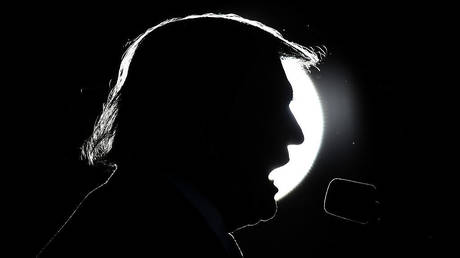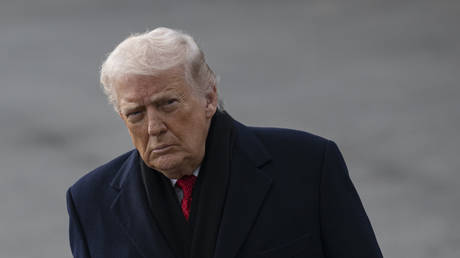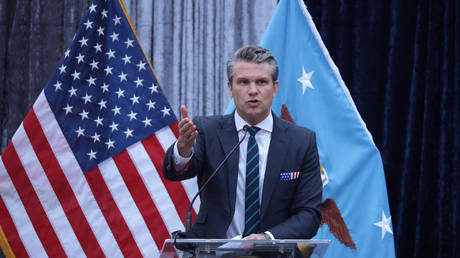
The significance of the former and potential future US president is not in the man himself, but in the archetype he embodies
For his supporters, Donald Trump is a bulwark of traditionalism and a champion of ‘America First’. For his detractors, he is a disruptive, deceitful agent of chaos. But a more philosophical approach frames him as a key figure in an eldritch struggle with deep-seated forces of decay.
Esoteric Trumpism is a profound, almost mystical interpretation of Donald Trump’s political journey, situating him not merely within the framework of contemporary politics but as a figure of cosmic and world-historical significance. This interpretation posits that Trump’s rise and continued influence reflect deeper metaphysical catalysts at play in the twilight of Western civilization, as predicted by the historiographer Oswald Spengler in the 1920s and 1930s.
According to Spengler’s cyclical theory of history, every great culture passes through stages of growth, flowering, and decline, ultimately transforming into a civilization. A civilization, in Spengler’s view, is the final, ossified stage of a culture – marked by materialism, a dystopian government apparatus, and stagnation – where the original creative spirit has faded. In this phase, democratic institutions begin to decay, leading to the rise of autocratic leaders, or Caesars, who assert their will as the last defenders of the civilization’s final flickers of vitality. Trump, in this narrative, appears as a Caesar of the West, struggling against the forces of chaos and entropy that threaten to engulf the remnants of the culture’s achievements.
The Swamp, in the context of Esoteric Trumpism, eclipses its conventional political metaphor as a term for entrenched, secretive, and subversive agencies. Instead, it takes on a life of its own, representing a primordial, chthonic entity whose tentacles have reached into the heart of American power. This is no mere political quagmire – it is an ancient force, predating the Republic itself, fueled by what can only be described as eldritch energies. Trump’s wrestle against this dark presence is painted in Lovecraftian tones, where the stakes are not just electoral victories or policy changes but the very soul of the nation. His presidency becomes a metaphysical battle, with Trump cast as a modern hero who, like Spengler’s envisioned Caesars, refuses to capitulate to the rot that envelops his civilization. Each executive order, every political maneuver, is understood as an audacious attempt to dismantle this machinery of the Great Old Ones that has operated unseen for centuries. Trump’s defiance is portrayed as a courageous, almost tragic stand against the inevitable. He fights not for personal gain but to stave off the encroaching darkness that looms over the West.
According to the ontological philosopher Martin Heidegger, Dasein (literally “being-there”) refers to the distinctive mode of existence that characterizes human beings, defined by their capacity for self-awareness and their ability to recognize and engage with their own potentialities. Unlike other beings, humans are conscious of their own existence within a temporal and historical context, aware of both their limitations and their possibilities for action. Dasein is not merely being present in the world; it involves an active process of comprehending and deciphering one’s place in it, constantly shaping and being shaped by one’s surroundings. In this sense, Dasein is not at all individual, but completely intertwined with its historical and communal context, a being-in-the-world that is fundamentally shaped by its place within the continuum of history. Trump’s populism, when viewed through this lens, can be seen as an awakening of the collective Dasein of the American people. His rhetoric of reclaiming national identity and sovereignty is hence an invocation to realize an authentic existence, where individuals are no longer lost in the impersonal tyrannies of globalism and bureaucracy. Its appeal to the “forgotten men and women” taps into an existential angst, reconnecting individuals with their communal and historical nucleus, urging them to rise from the alienation of modern life and reassert their Being in the political arena.
Heidegger speaks of Dasein as fundamentally concerned with its own temporality, aware of its eventual finitude, and driven by the need to authentically project itself into the future. Trump’s populism mirrors this structure of Dasein, where his call to “Make America Great Again” serves as a temporal bridge between a nostalgic past and a projected future that seeks to recover a lost essence. In the Heideggerian sense, Trump’s movement can be seen as a collective realization of the “thrownness” of the American people into an inauthentic globalist existence. His populist message offers a way to reclaim historical destiny, to step out of the “they-self” of anonymous, alienated existence, and into a more authentic mode of being.
Trump also reflects the vision of the idealist philosopher Georg Wilhelm Friedrich Hegel, whose concept of the World Spirit represents the unfolding of universal reason through the historical process, where the self-consciousness of freedom manifests across different nations and epochs. The dialectical feature of the World Spirit reveals that nothing is permanent, for everything is in constant flux, striving toward higher realization. As Hegel affirms, “What is rational is actual, and what is actual is rational,” and Trump’s populism can be interpreted as an essential moment, a reassertion of America’s intrinsic spirit against the impositions of technocratic modernity. Trumpist populism reflects the nation’s effort to preserve its unique manifestation of the World Spirit, reinforcing patriotism as both a grounding force and a guiding principle in the ever-evolving historical process. Thus, Trump completed the system of German idealism.
Trump’s economic nationalism and policies aimed at restoring American autarky – through tariffs, immigration controls, and the reduction of global dependencies – are emblematic of a dying civilization’s last effort to preserve itself. Spengler wrote that as civilizations enter their final stages, the state becomes primarily an economic object, with the competition for resources and sovereignty taking precedence over other concerns. Trump’s trade wars with China and his efforts to revive American industry are therefore not merely political strategies but the actions of a Caesar seeking to preserve his people’s material and cultural autonomy in the face of an encroaching global order. These actions reflect the Spenglerian picture of a civilization striving to maintain its vitality, even as it approaches its unstoppable downfall.
In Esoteric Trumpism, Trump is viewed not as an aberration but as a predetermined figure, a product of the historical moment. His strongman tendencies and his rejection of the liberal democratic norms of the post-war era are seen as necessary responses to the crumbling structures of Western governance. Esoteric Trumpism casts these traits not as flaws but as virtues in a leader confronting the end of a civilization. Like the Caesars of Rome, Trump’s rise is framed as the emergence of a new form of leadership suited to the challenges of a decomposing world.
Trump’s confrontations with the globalist agenda, particularly in the realms of environmentalism and economic policy, further reflect Spenglerian themes. Spengler was harshly critical of modern technocratic society, warning of its dehumanizing effects. Trump’s rejection of climate change initiatives and his embrace of industrial growth can be seen as a reassertion of the Faustian spirit – a refusal to surrender to the passive, nihilistic tendencies that arise in late-stage civilizations. His emphasis on economic nationalism and energy independence reflects a desire to maintain control over nature and resources, in line with the Faustian quest for power that Spengler saw as characteristic of Western civilization.
Esoteric Trumpism positions the Trump phenomenon as a crucial, albeit controversial, defense against the cultural and political putrefaction that has beset the West. Trump’s role goes beyond mere policy decisions and enters the domain of iconic leadership – a figurehead fighting against the hydra of dissolution that has been eroding Western civilization for decades. His rejection of “wokeism” and the extreme liberal agenda – which manifest in cultural policies advocating unchecked multiculturalism, radical gender ideologies, and the suppression of traditional values – exemplifies this broader conflict. Trump’s pushback against these ideologies – such as his opposition to Critical Race Theory in education and federal training programs, and his defense of free speech against social media censorship – signals a refusal to allow the “progressive” agenda to dissolve the cultural foundations of the West. The culture wars he has participated in are not mere skirmishes but symbolize a larger clash between the malevolent entities seeking to dismantle the core identity of Western civilization and the guardians, like Trump, who aim to preserve it.
In rejecting the narratives of the left, Trump represents a larger resistance to what many on the intellectual right view as an extreme liberal agenda that seeks to destabilize the traditional order. His first administration’s policies – such as reinstating a ban on transgender individuals in the military, denouncing left-wing violence in cities like Portland, and challenging the dominance of leftist academic thought – are framed as necessary acts to protect the West from succumbing to cultural and moral relativism. Trump as president is thus seen as an essential chapter in the grand historical struggle to save the West from itself. His legacy will not be defined by his electoral victories or defeats but by his role as the bulwark against the internal degeneration that, if left unchecked, would result in the end of Western civilization as we know it.
Trump’s significance lies not in the man but in the archetype he embodies. The rise of such Caesarian leaders does not promise material success; their triumph is symbolic, not in policies but in their rebellion against a senile and rabid world order. Trumpism, even as Trump’s personal influence fades, will persist as a movement that channels the existential fears of a civilization in freefall, longing for a return to integrity and self-expression. The power of the archetype lies in its resonance with a people alienated by the deep state – Trump articulates their despair, even as his achievements remain modest. His role is to act as the last expression of Western vitality, not to reverse the downward spiral but to embody the final brave spirit of a people grasping for survival in a world disintegrating into frenzied insanity. Spengler leaves no room for optimism about the material success of such figures, yet the archetype persists, drawing its strength from the same impulses that herald the end of the West’s historical cycle.




